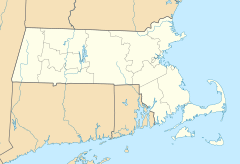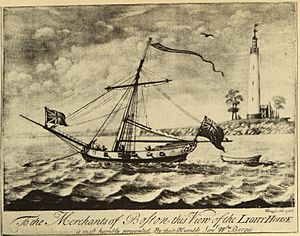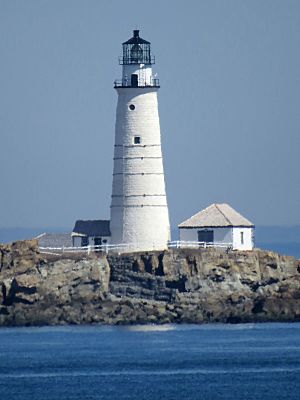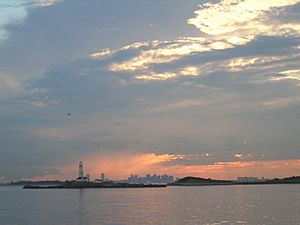Boston Light facts for kids
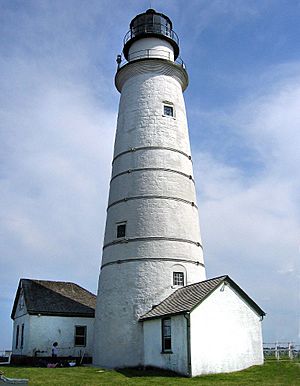 |
|
| Boston Light | |
|
|
|
| Location | Little Brewster Island Boston, Massachusetts |
|---|---|
| Coordinates | 42°19′41″N 70°53′24″W / 42.32794°N 70.8901°W |
| Year first constructed | 1716 |
| Year first lit | 1783 (current tower) |
| Automated | 1998 |
| Deactivated | 1776–1783 and during WWII. |
| Foundation | Granite Ledge |
| Construction | Masonry, Rubble Stone with brick lining |
| Tower shape | Conical |
| Markings / pattern | White with five steel bands and black trim |
| Height | 89 feet (27 m) |
| Focal height | 102 feet (31 m) |
| Original lens | Tallow candles installed in 1716 |
| Current lens | 2nd order Fresnel lens |
| Intensity | 1,800,000 candlepower |
| Range | 27 nautical miles (50 km; 31 mi) |
| Characteristic | Flashing white every 10 seconds. |
| Fog signal | HORN: 1 every 30s |
| USCG number | 1-425 |
Boston Light is a famous lighthouse located on Little Brewster Island. This island is in the outer Boston Harbor, Massachusetts. The first lighthouse built here in 1716 was the very first lighthouse in what is now the United States.
The lighthouse you see today was built in 1783. It is the second oldest working lighthouse in the U.S. The oldest is Sandy Hook Lighthouse in New Jersey. Boston Light is also special because it is the only lighthouse still actively staffed by the United States Coast Guard. Even though it became automated in 1998, a keeper still lives there. They often act as a tour guide for visitors. In 1964, Boston Light was named a National Historic Landmark.
Contents
Discovering Boston Light's Past
The first lighthouse keeper at Boston Light was George Worthylake. Sadly, he, his wife, and daughter drowned in 1718. This happened when their boat overturned as they returned to the island.
Boston Light During the Revolution
During the American Revolution, British forces controlled the original lighthouse. American troops attacked and burned parts of it twice. When the British left Boston in 1776, they blew up the tower. This completely destroyed it.
The lighthouse was rebuilt in 1783. It was the same height as the first one, about 75-foot (23 m) tall. In 1856, it was made taller, reaching 98 feet (30 m). A new lantern room was added, along with a special 12-sided Fresnel lens.
Early Days of the Lighthouse
The first lighthouse in America was lit on September 14, 1716. It was on Little Brewster Island in Boston Harbor. A small tax on ships entering or leaving Boston Harbor helped pay for its upkeep.
The first keeper, George Worthylake, also guided ships into the harbor. After his tragic drowning, young Benjamin Franklin wrote a poem about the event. He sold it on the streets of Boston.
In 1719, a keeper named John Hayes asked for a "great Gun" to be placed on the island. This gun would help answer ships in foggy weather. A cannon from 1700 was then supplied.
In 1751, a fire badly damaged the lighthouse. Only its stone walls remained.
Revolution Attacks and Rebuilding
In 1774, the British took control of the island. By 1775, the harbor was blocked, and the lighthouse became useless. On July 20, 1775, American troops burned the wooden parts of the lighthouse. The British started repairing it.
However, on July 31, 1775, General Washington sent Major Benjamin Tupper with 300 men. They defeated the British guards and destroyed the repairs. American forces fought off British boats as they left. General Washington praised Major Tupper and his men.
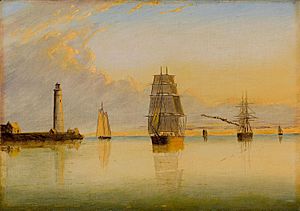
When the British left Boston on March 17, 1776, some of their ships stayed behind. On June 13, 1776, American soldiers attacked these ships. Before sailing away, the British blew up Boston Light.
In 1783, the Massachusetts Legislature provided money to build a new lighthouse. This new lighthouse is the one still standing today. It was 75 feet (23 m) tall. Its walls were 7 feet 6 inches (2.29 m) thick at the bottom.
Important Events and Keepers
On June 10, 1790, Boston Light became part of the new Federal Government. In 1811, Jonathan Bruce became the keeper. He and his wife saw a famous sea battle. This was between the American ship Chesapeake and the British ship Shannon on June 1, 1813. During this battle, Captain Lawrence of the Chesapeake said, "Don’t give up the ship."
In 1856, the tower was raised to 98 feet (30 m). It became a second-order station, meaning it had a powerful light. On November 2, 1861, a ship called the Maritana crashed near the lighthouse. It was a stormy night with heavy snow. Seven people survived by floating on the pilothouse. Five others swam to nearby rocks. A small boat rescued them.
In 1893, students from the Massachusetts Institute of Technology stayed on the island. They experimented with different types of foghorns. They wanted to find one that could be heard far away, especially in a tricky area known as the "Ghost Walk."
During World War II, the light was turned off for safety. It was turned back on July 2, 1945. Today, its light is very powerful. It can be seen for 27 nautical miles (50 km).
Boston Light Today
Boston Light became automated in 1998. However, it still has a resident Coast Guard keeper, Sally Snowman. She is helped by volunteers from the Coast Guard Auxiliary. These people mostly serve as guides for visitors.
Its light flashes white every 10 seconds. It uses a second-order Fresnel lens. This is one of only four such lenses still in use in Massachusetts. The light can be seen from 27 nautical miles (50 km; 31 mi) away. Boston Light is still an important navigation mark. However, many large ships now use Boston Harbor's North Channel. This channel is marked by Graves Light.
You can take guided tours of the island and lighthouse. These tours need to be arranged in advance. Ferries like the Columbia Point can take you there. The National Park Service also offers tours on summer weekends.
The lighthouse had major repairs in 2014. It was covered with scaffolding. It reopened to visitors in 2015.
Images for kids
-
Boston Light with The Graves Light behind it.


